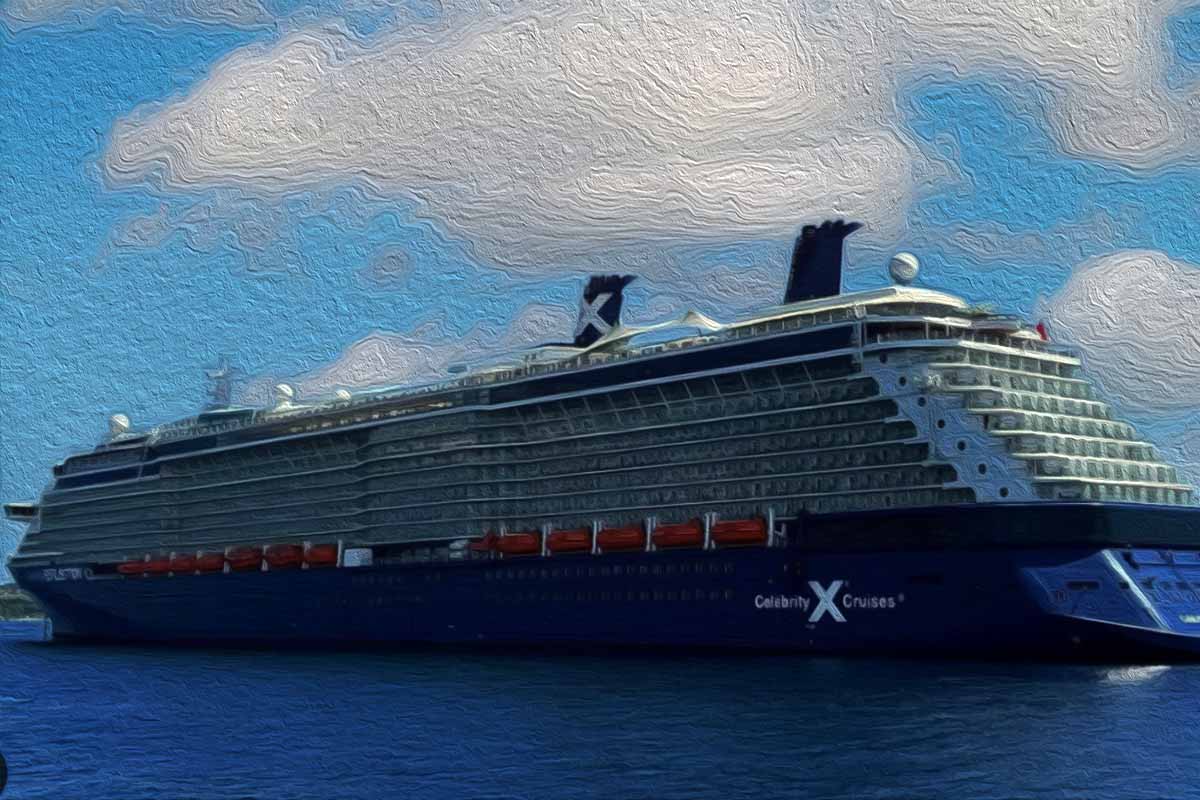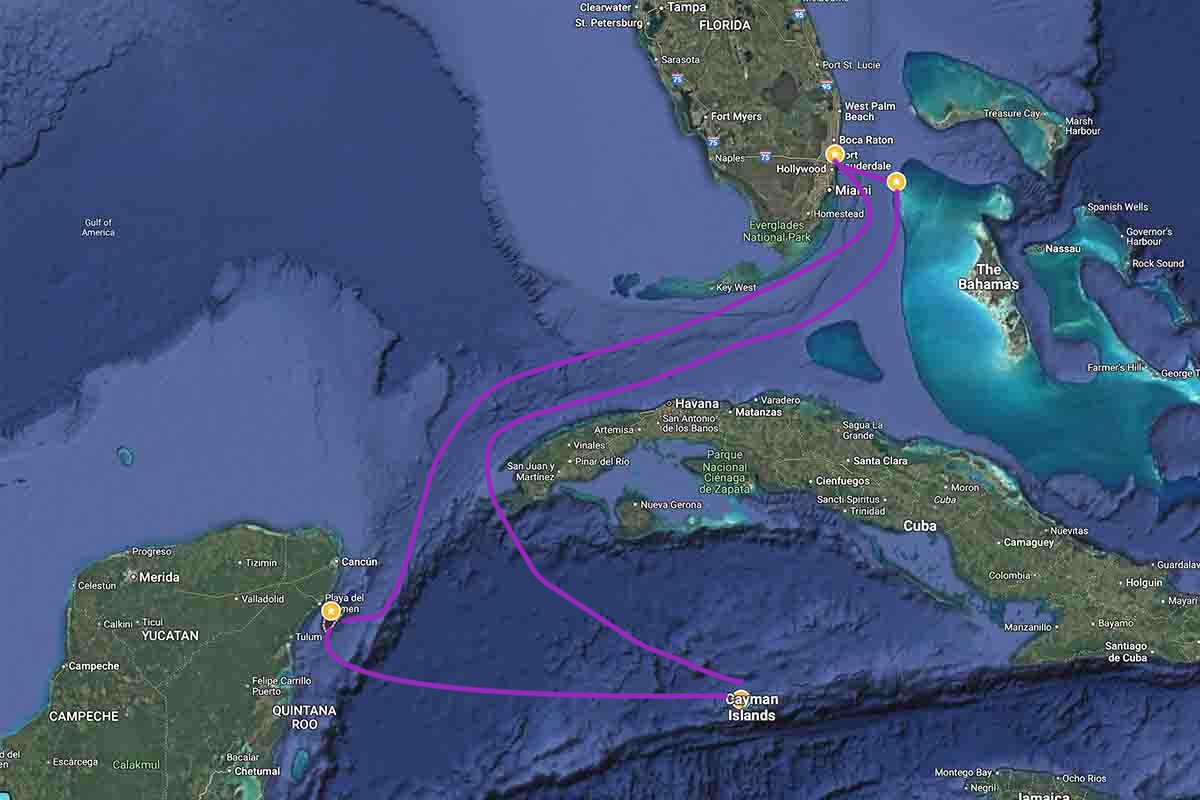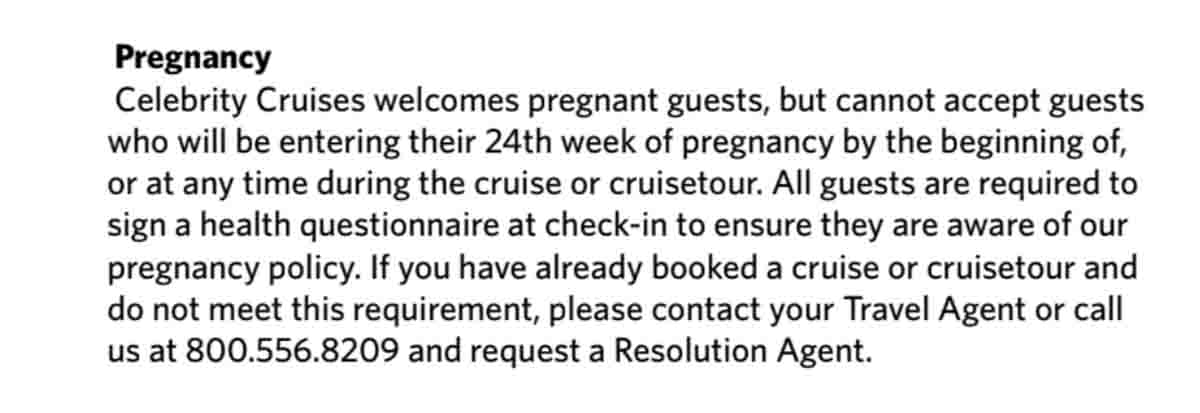Last Updated on July 5, 2025 by Michelle Couch-Friedman
First-time cruise passengers Marisa Vacca, her husband, and toddler couldn’t wait to board Celebrity Cruises Reflection last December. The family arrived in Ft. Lauderdale the night before embarkation and excitedly settled into their hotel.
But then a heavily pregnant Marisa began skimming the Celebrity Cruises pre-boarding instructions, and her heart sank.
“Celebrity Cruises welcomes pregnant guests but cannot accept guests who will be entering their 24th week of pregnancy by the beginning of, or any time during the cruise or cruise tour.”
In a panic, the mom-to-be called Celebrity Cruises. Marisa says a sympathetic cruise consultant suggested that she could try to hide her condition at check-in the next day. Marisa knew instantly that would be an impossible feat. At 29 weeks, she was very visibly in the late stage of pregnancy.
The following morning, the family headed to the port, hoping the cruise line’s pregnancy rule wasn’t set in stone. But representatives from Celebrity Cruises quickly clarified – Marisa was being denied boarding because of her advanced pregnancy.

The dejected Vaccas incorrectly assumed that they would, at least, receive a refund for their missed cruise. So they were shocked when they read through the denied boarding card handed to them by a supervisor of Celebrity Cruises. Not only did they lose their tropical vacation, but they also lost all the money they had spent on it.
That’s when Marisa sent her plea for help to the Consumer Rescue team.
“Doesn’t Celebrity Cruises bear some responsibility for this cruise fiasco?” she asked. “Why didn’t we know?”
That’s what Consumer Rescue aimed to find out.
Planning a tropical babymoon cruise on Celebrity Cruises
Marisa and her husband had started to plan their “babymoon” back in September. At the time she was already pregnant, but having never taken a cruise before, she wasn’t aware that her condition would be problematic.
The couple picked a seven-night cruise aboard Celebrity Reflection that would take them to Mexico, Grand Cayman, and the Bahamas before returning to Fort Lauderdale. The online booking process was simple, and the cruise line soon confirmed their trip.

After they booked the cruise, the Vaccas happily looked forward to what they considered their last vacation as a family of three.
But it was a cruise that was impossible for the Vaccas to navigate from the moment it was confirmed.
Ready to board the ship: Celebrity Reflection. Until…
Even as a first-time cruiser, Marisa was a savvy traveler and she knew that her family should arrive the night before Celebrity Reflection’s embarkation.
Related: Here’s why you should never fly the same day as your cruise
So the day before their cruise was set to sail, the family boarded a plane from dreary, wintry Hartford, Connecticut, and flew to warm and sunny Fort Lauderdale.
“We landed in Florida and we were so excited,” Marisa recalled. “After we checked into our hotel, I was relaxing and I started looking through the information Celebrity Cruises had sent me two weeks before the trip.”
That’s when Marisa zoomed in on the section in the Guest Ticket Booklet entitled “Pregnancy.” (This information can also be found on the Celebrity Cruises’ website on the Medical Needs page.)

Marisa had planned to get an early night’s sleep before heading down to the cruise port. Now her plans for the evening abruptly changed.
“I spent the next several hours talking with multiple Celebrity Cruises cruise consultants,” Marisa told me. “I hoped I was misunderstanding that blurb — especially after one of the phone agents told me just to pretend I wasn’t that pregnant. She said they woudn’t ask additional questions.”
But Marisa was not misunderstanding Celebrity Cruises’ policy about pregnant cruise ship passengers at all. She was already far too pregnant to be allowed to board the ship. But because the family had never cruised before, they were still hopeful.
Celebrity Cruises: Pregnant passengers can’t cruise after 23 weeks
After an anxiety-filled night, the Vaccas gathered their luggage and headed down to the port where Celebrity Reflection waited. They hoped they would soon be aboard, sailing to the Caribbean with tropical mocktails in hand.
But it wasn’t to be.
As soon as the couple handed over their documents, the Celebrity agent asked Marisa about her pregnancy.
“There was a form we filled out a few days before, and I had answered honestly,” Marisa explained. “It asked if I was more than 23 weeks pregnant. I checked “yes.” So my record already had that information. But even at the pier, I was still hoping there was some way we would be boarding the cruise.”
Unfortunately, that form confirmed that Marisa was too pregnant to sail on Celebrity Reflection.
She soon received her Denied Boarding card, and although her husband and toddler could sail, they understandably declined. The dejected family headed back to their hotel and arranged for their flights back home.
Asking Consumer Rescue to investigate this cruise fiasco
Originally, Marisa thought that her family would get a future cruise credit. She assumed that after the baby was born they could redeem that voucher and enjoy their first cruise together – as a family of four.
But Celebrity Cruises soon dashed those hopes, too. Would-be passengers who are denied boarding because they are ineligible to cruise aren’t eligible for a refund or cruise credit. That is true across the entire cruise industry.
However, if a passenger is mistakenly prevented from boarding the ship – or if the cruise line has some culpability in the situation (as was the case with this pregnant Norwegian Cruise Line passenger), the customer should receive compensation.
So when Marisa asked Consumer Rescue for help, I was hoping to find something in her paper trail that pointed to Celebrity as contributing to her oversight.
Unfortunately for the Vaccas, except for the fact that their cruise contract didn’t have a bolded area warning pregnant cruisers of the restrictions, as I’ve seen in other cruise line contracts, I couldn’t find anything that would compel Celebrity to take some responsibility in this fiasco. It is always every cruise ship passenger’s responsibility to know the rules and regulations for their own travel.
Marisa’s paper trail showed that as new cruisers, her family wasn’t familiar with the rules for pregnant passengers. She hadn’t read through the documents sent from Celebrity Cruises until it was just about time to board the ship. And she hadn’t done a Google search for “pregnant cruise passenger restrictions” — until it was too late.
Of course, though, regular readers know I sometimes advocate for consumers even when the facts aren’t quite on their side. So, I asked the executive team at Celebrity Cruises to reconsider Marisa’s request for a future cruise credit.
There was good and bad news on the way.
The good and bad news for these Celebrity Cruises customers
In the end, Celebrity refunded the Vaccas’ port fees and taxes. Unfortunately, that is the extent of what the cruise line was willing to provide. It is also the extent of what the cruise line technically owed the family according to their contract of carriage.
The bad news is that this family lost over $10,000 to this avoidable cruise fiasco.
But the good news is that Marisa’s baby arrived in March – safe and sound – and is super cute (yes, I’ve seen the photos). And that’s the best possible ending to this unpleasant experience.
What to consider about taking a cruise while pregnant
Before you book a cruise, there are a few things to consider if you are pregnant or may become pregnant prior to your journey.
1. All major cruise lines adhere to the 24-week pregnancy rule
It’s important to keep in mind that all cruise lines adhere to the same 24-week pregnancy rule. If you have already entered or will begin your 24th week of pregnancy during your cruise, you will be denied boarding.
Fact: All cruise lines require pregnant cruise ship passengers to fill out a Health Questionnaire verifying that they will not cross into their 24th week of pregnancy before the cruise ends. It is unwise to fib about this detail as it could put you and your baby at risk. Medical care is limited onboard a cruise ship and is not the place to find yourself in an emergency situation.
Note: Some river and canal cruises permit passengers to travel slightly further into their pregnancy, likely because the vessels are close to land-based standard medical care at all times. Passengers should always carefully review their cruise line’s policies before booking.
2. Make sure you have travel insurance
All travelers should carefully consider their need for travel insurance, but for pregnant or potentially pregnant travelers, it should be a no-brainer.
In most cases, domestic health care insurance doesn’t cover travelers after they enter international waters, including any treatment aboard a cruise ship. This often comes as a surprise to passengers who board closed-loop cruises, failing to understand that they will be traveling internationally. Many cruisers surprised by emergency medical situations have discovered too late that their home-based health insurance will not pay for treatment on the ship or anywhere along their itinerary.
Medical care onboard a cruise ship is limited and super expensive. So before you board your next cruise, make sure you’re protected against the financial repercussions of surprise medical treatment abroad.
Related: Why couldn’t NCL give me a blood transfusion and let me cruise?
If you are considering becoming pregnant between the time you book your cruise and embarkation, choose a policy that will cover a pregnancy-related cancellation. Travelers can use a site like Squaremouth or InsureMyTrip to compare various policies based on their personal details and needs.
Note: You can’t purchase a travel insurance policy to cover a pregnancy-related cancellation after your pregnancy has been confirmed. This travel insurance guidance only applies to pre-planning.
3. Check your pregnancy status before your cruise becomes nonrefundable
Cruise ship passengers should always keep an eye on the date that their trips become nonrefundable. If you are, or think you may be pregnant, it’s critical that you confirm before that trip becomes nonrefundable. Typically, your cruise contract will enter a penalty phase around 120 days before embarkation – and many are fully nonrefundable around 90 days out.
4. Remember that a cruise may not be as relaxing as you imagine
Several years ago, I heard from a frazzled mom who thought a cruise would be the perfect way to unwind with her family. But it turned out to be a disaster. She hadn’t done any meaningful research into cruising with a baby and discovered it was much harder to entertain her infant on the ship than at home.
Read her story here: You can take your baby on a cruise, but will it be fun?
Unfortunately, the realities of cruising while pregnant or with a toddler in tow can be similarly disappointing.
The cruise ship might be loud and not right for a mommy-to-be. I recently reported on the increase in cruise ship passengers acting out and getting banned permanently.
Related: Will your cruise be ruined by the bad behavior of other passengers?
It might be best to pick a more serene location for your babymoon. Sitting on a beach, drinking mocktails and eating healthy food while watching the sun set over the horizon could be better.
5. Get a doctor’s approval and bring a note with you to the cruise port
Lastly, if you do intend to take a cruise while pregnant, it is critical that you get your doctor to verify your due date.
I know from experience that ladies “show” at different rates. At 37 weeks pregnant with my first daughter, I went to a Lamaze class where everyone looked much further along than I did. The instructor immediately suggested I return closer to my due date. Luckily, I had my midwife’s recommendation with my due date, or I would have been “denied boarding” my Lamaze class!
Cruise port crew may not be able to accurately determine how many weeks pregnant you are either. Although you may be within the green zone, if you are denied boarding because a crew member thinks you’re further along than you say you are, you’ll miss your cruise all the same. So, always bring a note from your doctor that clearly indicates your due date to avoid that unpleasant outcome.
The bottom line
Taking a cruise during pregnancy is a personal choice that should only be made after considering all the ramifications. Of course, you also must keep in mind the cruise industry’s 24-week pregnancy rule and your own health and circumstances. It is by no means a decision to take lightly. Pregnant travelers should always consult with their obstetrician before booking a cruise, especially as they enter the second trimester.
Remember, as you approach and enter the third trimester, all bets are off: The cruising choice is no longer yours. No major cruise line permits women to cruise beyond the 23rd week of pregnancy.
But if you believe you’ve been denied boarding your cruise by mistake, Consumer Rescue is here to help. We fix consumer problems. Our advocacy is always fast, friendly, and best of all, free. (Michelle Couch-Friedman, Founder of Consumer Rescue)



